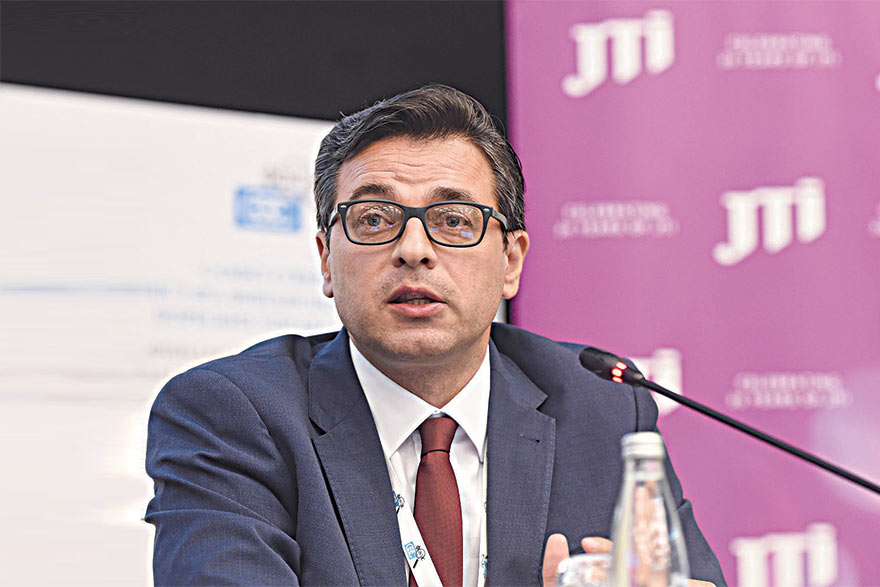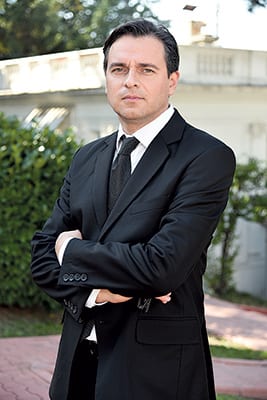Together with the Government of Serbia and the Embassy of Japan, JBAS is also optimistic regarding the potential arrival of new Japanese companies that will have an additional positive impact on the development of Serbia and prompt it to become a better environment for the life and work of its citizens
The largest Japanese investment in Serbia, the construction of the Toyo Tires factory in Inđija, started in December 2020, during times when many foreign investors are refraining from bold moves. “Indeed”, says Goran Pekez, president of the JBAS Board of Directors, “the investment of Japanese company Toyo Tires, one of the world’s largest tyre manufacturers, is significant in many respects.”
The operations of this factory will have a direct impact on the development and economy of the entire country, considering that planned exports will contribute to Serbia’s macroeconomic stability, explains our interlocutor. “From a narrower point of view, the employment of over 500 workers in Inđija will contribute to more balanced regional development. The very fact that this factory is Toyo Tires’ first production centre in Europe indicates the company’s high degree of confidence in the stability of the Serbian economy.”
At the same time, he notes, it encourages new investors from Japan, but also other counties, to opt to locate certain parts of their businesses in Serbia.
“As a representative of the Japanese Business Alliance in Serbia, I am very proud of the fact that this investment has shown that, despite the great physical distance between the two countries and altered business circumstances due to the Coronavirus pandemic, it is possible to further strengthen business ties between Japan and Serbia and to improve our economic and bilateral cooperation,” says Pekez.
We are thankful to have the direct support of President Vučić and Ambassador Katsumata, who jointly visited the launch of construction of Toyo’s factory building, as well as the best farmers of Japan Tobacco – just in the course of December
Other investments from Japan have also been announced. What most motivates Japanese investors to launch their business activities in Serbia?
– Following the historic 2018 visit of Japanese Prime Minister Abe, many Japanese investors now view Serbia as a significant regional centre for CEFTA and the Western Balkans region or, in the case of manufacturing companies, as a strategic hub for exports to the markets of the EU, Russia and Turkey.
In addition to market opportunities, the willingness of the Republic of Serbia to create partnerships with investors is also of crucial importance to deciding on investment destinations.
It is my pleasure to note that investments from Japan to Serbia have been growing lately, in terms of invested funds. Until a few years ago, they were measured in the millions, then in the hundreds of millions, and today we are expecting new ones that are perhaps worth over a billion euros.
Together with the Government of Serbia and the Embassy of Japan, JBAS is also optimistic regarding the potential arrival of new Japanese companies that will have an additional positive impact on the development of Serbia and prompt it to become a better environment for the life and work of its citizens.
How do Japanese investors and companies of Japanese origin differ from others?
– All Japanese companies operating in Serbia have financially stable backgrounds and these investments also imply transfers of high technology and a modern way of doing business. At the same time, we bring Japanese cultural values – high standards of safety at work, environmental protection, social responsibility. Advanced innovative solutions are applied in business processes, the business culture and organisational systems, among which I would single out Kaizen.

Our investors are becoming partners in building economies based on the values and aspirations of modern society – improving climatic conditions, developing a digital environment and intensifying international trade and cooperation. I would even say that Japanese investments are like origami – from simple raw materials, with proper skills, knowledge and the continuous improvement of the process, sophisticated results are achieved.
How did your members respond to the challenge of the 2020 pandemic?
-I am pleased to note that JBAS has conducted a number of activities to maintain communication among members and to help them face the challenges in the best possible manner. We are proud of all of our members, who have demonstrated an exceptional ability to adapt to change, maintain their market positions and keep performances at high level, while undertaking all possible commitments to preserve the health of their employees.
I would also like to mention that the pandemic has not impaired the business interests of a number of Japanese companies in Serbia. Together with the Embassy of Japan and the Government of the Republic of Serbia, we strive to strengthen the existing base, highlight positive examples and motivate other companies to join the business community that serves to improve relations between Serbia and Japan. We are thankful to have the direct support of President Vučić and Ambassador Katsumata, who jointly visited the launch of construction of Toyo’s factory building, as well as the best farmers of Japan Tobacco – just in the course of December. There is no better way to enhance bilateral economic development than to support projects that deliver the highest employment and investments. We hope to have more such occasions in future.
What are the expectations of JBAS for 2021?
– JBAS member companies share global optimism that the Serbian economy will resume its positive trends in the coming period, while we would like to see Serbia progressing through the post-COVID phase as quickly as possible, and with new energy for the society and economy to recover.
Until a few years ago, Japanese investments in Serbia were measured in the millions, then in the hundreds of millions, and today we are expecting new ones that are perhaps worth over a billion euros
We also fully support Serbia’s efforts to join the EU, in the hope that those efforts will develop further. The outcomes of these changes are expected to improve legislation, the environment, conditions for doing business and eventually quality of life. On the Japanese side, we hope that the Olympic Games will be organised in 2021, as planned, and many of our members are sponsors or supporters: for example, Toyota organised a series of events to promote technological achievements in order to support the staging of the Games. As JBAS, we will stand as a partner to promote preparations and hopefully celebrate Serbia’s sporting successes.
How satisfied are you with the Serbian Government’s measures to alleviate the negative consequences of the pandemic?
– I am pleased to note that the Serbian Government has been responsive to the COVID crisis, acting proactively to protect both the economy and the citizens, and successfully balancing health system resources and industry capacities.
On behalf of JBAS, I would like to express satisfaction with the resulting macroeconomic indicators, which show that the economy of Serbia has suffered minimum losses. Such data promise a shorter recovery period and the swift resumption of previously increasing trends in the country’s development. In order to make further progress, it is also vital to maintain strong public finances and infrastructure development in this period, and we are happy to witness positive improvements in this regard.
How did JBAS support its members during 2020?

– During 2020 we focused on all topics that are of interest to the business of our members. Apart from support regarding COVID issues, we organised numerous seminars and training courses that were held online.
Our partners included the Embassy of Japan in Belgrade, JETRO, JICA, Serbian ministries and other institutions of the Republic of Serbia, as well as a large number of companies, organisations and associations. The topics we dealt with were tax issues, environmental protection, the labour market, finance and public procurement, while we also focused on Kaizen education, human resources and communications. There has also been an intensifying of the activities of our committees, which deal with challenges in their particular lines of business, from industrial production and IT, to the automotive sector and high technologies.
The previous period also saw your members provide significant assistance to equip the Serbian healthcare system during the pandemic. Please tell us more about this.
– We are proud and grateful to our members for assisting the Serbian healthcare system in order to mitigate the effects of the pandemic by providing donations in medical equipment, sanitary packages, goods and support related to medical treatment and providing mobility, but also supporting the fight against the virus through the direct involvement of their employees.
More concretely, we secured donations in the amount of 137,000 euros, with some of the beneficiaries including the Ministry of Health, the National Health Insurance Fund, General Hospital Vršac, the Clinical-Hospital Centre Dr Dragisa Misovic Dedinje, Senta Hospital and other hospitals, the Institute for Maternal and Child Health Protection in Belgrade, patients’ organisations for IBD (Inflammatory Bowel Diseases) – UKUKS, NORBS (the National Organisation for Rare Diseases in Serbia), beneficiaries of the UNICEF programme, the most vulnerable sections of the population that were additionally impacted by the COVID-19 crisis (the homeless, over 65s, people with disabilities, children, low income families). Moreover, representatives of JBAS and the B92 Fund also delivered 10 flow meters to the Zvezdara Hospital Centre.
| PARTNERSHIP The willingness of the Republic of Serbia to create partnerships with investors is also of crucial importance when deciding on investment destinations. | PROSPECTS We would be happy to see positive trends regarding further accession to the EU, trade liberalisation, the application of relevant legislation and the improvement of the business environment in Serbia. | COMPASION We are proud and grateful to our members for assisting the Serbian healthcare system in order to mitigate the effects of the pandemic |
|---|